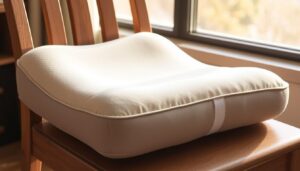New moms often struggle to get good postpartum sleep. A new baby brings big changes. It’s hard to adjust to these changes. After having a baby, moms must focus on their health. They need to find ways to sleep better. This means making their sleep space comfy and dealing with any pain from recovery. This article gives newborn mothers the ergonomic sleep tips they need to get a good nights rest.
Key Takeaways
- Prioritize creating a comfortable sleep environment.
- Manage postpartum discomfort to improve sleep.
- Establish a consistent sleep routine.
- Consider ergonomic adjustments for better rest.
- Seek support to minimize sleep disruptions.
The Postpartum Sleep Challenge
After giving birth, women face many physical changes. These changes can mess up their sleep. The postpartum time is a big adjustment, both emotionally and physically.
Physical Changes Affecting Sleep
New moms go through big physical changes. These changes affect their sleep a lot. Two main areas are healing tissues and changes in weight.
Healing Tissues and Discomfort
After childbirth, the body heals. This healing can cause pain and soreness. It makes it hard to sleep well. The healing process is important, but it can really mess up sleep. Using pillows or taking pain meds can help.
Weight Distribution Changes
Pregnancy and childbirth change how weight is spread out in the body. This can strain the back and muscles, causing pain. Changing how you sleep and using supports can help.
It’s key for new moms to understand these physical changes and how they affect sleep. By knowing the challenges and finding ways to deal with them, moms can sleep better after having a baby.
Why Ergonomic Sleep Matters for New Mothers
For new moms, ergonomic sleep is very important. The time after having a baby is key for getting better. Good sleep helps a lot with healing.

Connection Between Sleep Quality and Recovery
Good sleep helps the body heal after having a baby. It’s important for both body and mind. It also helps avoid feeling sad or anxious.
Physical Healing Benefits
Proper sleep positioning helps the body heal. Sleeping on your side with a pillow can ease pain. It also helps blood flow, which is good for healing.
Mental Health Advantages
Good sleep also helps the mind. Adequate rest keeps mood stable and lowers stress. This makes it easier to care for a baby.
By focusing on ergonomic sleep, new moms can recover better. It’s not just about sleeping a lot. It’s about sleeping well to heal.
Understanding Your Postpartum Body’s Needs
After having a baby, your body goes through big changes. These changes can make it hard to sleep well. Taking care of a new baby adds to the discomforts.
Common Physical Discomforts After Birth
New moms often feel pain in their perineum, back, and hips. These pains can make it hard to sleep well.
Perineal Pain Management
Perineal pain is common after a vaginal delivery. Using cold compresses and taking warm baths can help. Also, sitting on supportive cushions can ease the pain.
Back and Hip Strain
Back and hip pain come from the way you sit and move with a baby. Keeping good posture and using ergonomic supports helps. Doing gentle stretching can also help.
By dealing with these pains, new moms can sleep better. This helps them recover faster. It’s key to manage these pains for better rest and health.
Essential Ergonomic Sleep Tips for New Moms
Getting good sleep is key for new moms. Making ergonomic changes can help a lot. After having a baby, your body changes a lot. It’s important to change how you sleep to feel comfortable and supported.
Proper Spinal Alignment Techniques
Keeping your spine aligned while sleeping is very important. It helps you feel less pain and recover better. Make sure your spine stays in its natural shape with the right pillows or adjustments.
Neck and Shoulder Positioning
It’s important to position your neck and shoulders right. A supportive pillow can keep your neck straight. This helps avoid pain in your shoulders and upper back. Try a contoured pillow that fits your head and neck.

Supporting your lower back is key for your spine’s natural curve. Use a firm pillow or a rolled towel under your knees if you sleep on your back. Or, a pregnancy pillow that supports your whole body is also good.
Using these ergonomic sleep tips can make a big difference. New moms can sleep better, recover faster, and feel better overall.
Optimal Sleeping Positions for Postpartum Recovery
Choosing the right sleeping position is key for postpartum recovery. New moms need lots of sleep to heal. The right position helps a lot.
Side-Sleeping Techniques
Side-sleeping is good for postpartum women. It helps with pain from pregnancy and childbirth. Here are some tips to do it right.
The Modified Fetal Position
The modified fetal position means curling up on your side with knees bent. It eases back strain and helps sleep better. Make sure your spine is straight to avoid back pressure.
Pillow Placement for Support
Pillows help a lot for a good night’s sleep. Put one between your knees for hip alignment. Another under your belly supports your back. This can make sleeping much better.
Using these side-sleeping tips and pillows can make sleep better. It’s all about making your sleep space good for healing.
Also, listen to your body and change positions if needed. If pain doesn’t go away, talk to a doctor for help.
Supportive Sleep Products for New Mothers
Supportive sleep products help new moms sleep better after having a baby. They are key for better sleep and healing after childbirth.
Specialized Postpartum Pillows
Special pillows for new moms offer comfort and support. They come in many shapes and sizes to meet different needs.
Body Pillows and Their Uses
Body pillows are long and support the whole body. They help new moms sleep better and ease back and hip pain.
Benefits of Body Pillows:
- Provide full-body support
- Help in maintaining proper spinal alignment
- Can be used for breastfeeding support
Wedge and Support Cushions
Wedge and support cushions are smaller and target specific body areas. They help with back, hip, and belly pain.
Types of Wedge and Support Cushions:
- Lumbar support cushions for back pain relief
- Belly support cushions for comfort during sleep
- Hip support cushions to alleviate hip pain
Here’s a comparison of different supportive sleep products:
| Product | Purpose | Benefits |
|---|---|---|
| Body Pillows | Full-body support | Improves spinal alignment, comfortable for breastfeeding |
| Wedge Cushions | Targeted support | Relieves back, hip, and belly discomfort |
| Support Cushions | Specific area support | Enhances sleep comfort, reduces pain |

In conclusion, supportive sleep products like postpartum pillows are vital for new moms. They offer comfort and support, improving sleep and aiding in recovery.
Creating an Optimal Sleep Environment
The sleep environment is key for postpartum women. A good sleep setting helps them rest and recover better.
Temperature and Lighting Adjustments
Changing the temperature and lighting can improve sleep. These changes make a sleep area more comfy and relaxing.
Ideal Room Temperature Settings
Keeping the room at the right temperature is important. It should be between 60°F and 67°F (15.5°C to 19.4°C). This keeps the body comfortable and helps sleep better.
Tips for temperature control:
- Use a thermostat to keep the temperature steady.
- Don’t put the bed near heating or cooling vents.
- If needed, use a fan or space heater but make sure they’re not too loud or cold.
Light Blocking Strategies
Light can affect sleep a lot. Using light-blocking methods helps make a dark sleep area. This is key for good sleep.
Effective light-blocking methods include:
- Using blackout curtains or shades.
- Installing window blinds that block light well.
- Stay away from screens (like phones or tablets) an hour before bed.
Experts say, “Darkness helps the body make melatonin. Melatonin is the hormone that helps us sleep and wake up.”
“A dark, quiet sleep environment is crucial for improving sleep quality.”
By controlling temperature and blocking light, new moms can make a sleep area that helps them recover and feel better.
Nighttime Feeding Ergonomics
Ergonomic nighttime feeding is key for new moms. It helps avoid discomfort and aids in recovery after childbirth. Nighttime feeding is vital for newborns, and ergonomic practices make it more comfortable for moms.
Breastfeeding Positions That Support Your Back
Breastfeeding is good for both mom and baby. But, it’s important to think about posture to avoid back pain. Proper breastfeeding positions help prevent discomfort and support the back.
Side-Lying Nursing Techniques
Side-lying nursing is comfy, especially at night. Lie on your side with your baby facing you. Make sure your body is straight, and use pillows for support. This helps reduce back strain.
Proper Pillow Support While Feeding
Pillows can greatly improve comfort during breastfeeding. Put a pillow under your baby to keep them at the right height. Also, use a pillow behind your back for extra support. This keeps you comfortable and reduces back pain.
Here are some tips for using pillows:
- Choose a firm pillow to hold your baby’s weight.
- Put a pillow under your knees to ease lower back pressure.
- Adjust the pillows to keep a comfy position.
By using these ergonomic tips for nighttime feeding, moms can feel better and support their health after giving birth.

Partner Support for Better Sleep
Partner support is very important for new moms who are struggling with sleep after having a baby. The time after having a baby is not just for the mom to get better. It’s also a time when partners can really help, especially with sleep.
Dividing Nighttime Responsibilities
One big way partners can help new moms is by sharing nighttime duties. This means taking turns with feeding, changing diapers, and calming the baby. By doing these tasks together, both partners can rest better.
Creating Shift Schedules
Setting up shift schedules is a smart way to handle nighttime duties. For example, one partner can watch the baby from 8 PM to 12 AM. Then, the other partner takes over from 12 AM to 4 AM. This way, both get a good amount of sleep.
Delegating Non-Feeding Tasks
Partners can also help by doing non-feeding tasks like changing diapers, burping the baby, or just being there for comfort. This helps the mom a lot and lets her rest more.
| Task | Partner 1 | Partner 2 |
|---|---|---|
| Feeding | 8 PM – 12 AM | 12 AM – 4 AM |
| Changing Diapers | 8 PM – 12 AM | 12 AM – 4 AM |
| Soothing the Baby | Shared | Shared |
By working together and sharing tasks, partners can help new moms get the rest they need. Good communication and teamwork are very important for handling nighttime duties and making sure both partners sleep well.
Managing Common Postpartum Sleep Disruptors
The postpartum period often brings sleep problems. New moms face many challenges that hurt their sleep. These include physical pain and discomfort.
Addressing Pain Points
Pain management is key in postpartum care. Getting rid of pain helps sleep better. Safe pain relief options are out there and should be tried.
Safe Pain Relief Options
For postpartum pain, acetaminophen or ibuprofen are good choices. Always talk to a doctor first. Follow the dosage to stay safe.
When to Use Heat or Cold Therapy
Heat or cold can help with pain. Cold therapy is good right after birth to reduce swelling. Heat therapy can relax muscles and make you feel better later. It’s important to use them right to avoid problems.
Understanding and tackling sleep disruptors helps new moms sleep better. Good pain management is part of caring for new moms.
Daytime Habits That Improve Nighttime Sleep
Daytime habits are key for good sleep at night for new moms. Healthy habits during the day help sleep better at night.
Strategic Napping Techniques
Napping is important for daytime habits and sleep at night. New moms often nap to make up for lost sleep.
Optimal Nap Duration
Naps should be long enough to rest but not too long. 20-30 minutes is best. It’s long enough to rest but not too deep.
Timing Naps for Maximum Benefit
When you nap matters. Napping too close to bedtime can mess up sleep. Nap earlier in the day, like when your baby sleeps.
- Nap when your baby naps to sync rest.
- Avoid napping within 3-4 hours of bedtime.
- Keep naps consistent for a routine.
Other daytime habits also help sleep better at night. Exercise, eating well, and managing stress are all good.
Self-Care Practices for Sleep-Deprived Moms
Self-care is key for moms who don’t get enough sleep. The time after having a baby is hard, and not sleeping well makes it worse. By doing self-care every day, new moms can sleep better and feel better too.
Relaxation Techniques Before Bed
Doing relaxation tricks before bed helps new moms sleep better. Two good ones are Progressive Muscle Relaxation and Breathing Exercises.
Progressive Muscle Relaxation
This method makes you tense and then relax different body parts. It helps you feel less tense and more relaxed, which is good for sleep. Start by tensing your toes, then relax them. Keep going up your body, tensing and relaxing each part.
Breathing Exercises for Sleep
Breathing tricks also calm your mind and body before bed. Diaphragmatic breathing or 4-7-8 breathing can slow your heart and relax you. For 4-7-8, breathe in for four, hold for seven, and breathe out for eight. Doing this can calm your nerves.
Adding these tricks to your bedtime routine helps sleep-deprived moms sleep better. It makes a good sleep space and improves sleep quality.
When to Seek Professional Help
After having a baby, sleep problems are common. But, some signs mean you need help from a doctor. New moms often struggle to sleep well after birth.
While some sleep trouble is normal, serious issues can happen too. It’s important to know when to get help.
Signs of Postpartum Sleep Disorders
Postpartum sleep disorders can show up in many ways. This includes insomnia, sleep apnea, and restless leg syndrome. It’s key to know the signs of serious sleep problems.
Differentiating Normal from Concerning Symptoms
Normal sleep issues after having a baby might make it hard to sleep. But, some signs are not okay. These include not sleeping well even when the baby sleeps well.
Feeling very tired during the day is also a red flag. So is feeling anxious or depressed.
Red Flags for Medical Attention
Some symptoms need help right away. This includes severe depression, anxiety that stops you from living your life, or postpartum psychosis. Also, if you have physical problems like a lot of pain or trouble breathing, get medical help fast.
| Symptom | Normal Postpartum | Concerning Symptom |
|---|---|---|
| Insomnia | Occasional difficulty sleeping due to newborn care | Persistent difficulty sleeping despite stable newborn sleep |
| Daytime Sleepiness | Feeling tired due to nighttime feedings | Excessive daytime sleepiness interfering with daily activities |
| Mood Changes | Mood swings due to hormonal changes | Symptoms of depression or anxiety |
Knowing the signs of sleep disorders and when to get help is very important. It can help a new mom feel better and recover faster. If you’re worried about your symptoms, talk to a doctor.
Conclusion: Prioritizing Rest in Your Postpartum Journey
Rest is key during the postpartum time. It helps a new mom get better and feel good. The body and mind change a lot after having a baby. So, it’s important to sleep well.
Knowing what your body needs and using good sleep tips can help. This means sleeping right and using special pillows. It helps you sleep better.
Make your sleep area cozy and share feeding duties with your partner. This makes sleeping easier. By resting well, new moms can feel better and take care of their babies.
When new moms rest, they can take care of themselves and their babies better. This starts a happy and healthy family.
FAQ
What are some ergonomic sleep tips for new moms to improve their postpartum sleep?
New moms can sleep better by keeping their spine straight. They should use body pillows for support. Side-sleeping is also good.
They should also make their sleep area comfy. This means the right temperature and light.
How can new mothers manage common physical discomforts after birth to improve their sleep?
New moms can ease pain and discomfort. They can use pain relief and relax before bed. Supportive pillows help too. DISCOMFORT Definition & Meaning – Merriam-Webster
What are the benefits of ergonomic sleep for new mothers?
Ergonomic sleep helps new moms heal and feel better mentally. It makes them sleep better and feel less pain.
How can partners support new mothers in improving their sleep?
Partners can help by taking turns at night. They can do tasks and help with feedings. This helps everyone get some rest.
What are some self-care practices that can help sleep-deprived mothers?
Sleep-deprived moms can relax before bed. They can try muscle relaxation and deep breathing. Napping at the right time also helps.
When should new mothers seek professional help for postpartum sleep disorders?
Moms should see a doctor if they can’t sleep well. Signs like constant tiredness or pain need medical help. Fatigue – Wikipedia
How can daytime habits impact nighttime sleep for new mothers?
Daytime naps can affect sleep at night. The right nap length and time is key. Too long or wrong timing can mess up sleep.
What are some ergonomic breastfeeding positions that support back health?
Ergonomic breastfeeding helps back health. Side-lying and using pillows are good. They reduce strain and pain.







